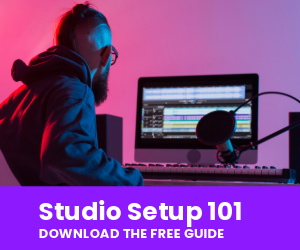
Proper gain staging is crucial for capturing clean and optimal audio signals during the recording stage. It ensures a healthy signal-to-noise ratio, prevents distortion, and allows for maximum headroom. By following these steps, you can achieve a sonically pleasing and technically efficient recording.
Goal of Gain Staging
The primary goal of gain staging during the recording stage is to capture clean and optimal audio signals. This involves maintaining a healthy signal-to-noise ratio, preventing distortion, and ensuring maximum headroom. Proper gain staging sets the foundation for a mix that is both sonically pleasing and technically efficient.

Steps to Achieve Gain Staging
1. Start with a Clean Signal
Ensure that your source signal, whether from a microphone or instrument, is clean and free from unwanted noise. A quality source signal contributes to a solid foundation for gain staging.
2. Set Appropriate Input Levels at the Preamp
Adjust the input gain on your preamp to achieve a strong signal without introducing distortion. Aim to utilize the full dynamic range of your analog-to-digital converter without overloading it.
3. Monitor Input Levels
Use the meters on your preamp or audio interface to monitor input levels. Keep an eye on peak levels to avoid clipping, which can lead to distortion and irreparable damage to the recorded signal.
4. Balance Input Levels Across Multiple Tracks
When recording multiple tracks simultaneously, maintain a balanced relationship between input levels. This ensures consistency in the recorded signals and facilitates a smoother mix during the later stages.
5. Consider the Use of Outboard Gear
If using outboard processors like compressors or equalizers during recording, be mindful of their input and output gains. Adjust these settings to optimize the performance of the external gear without unnecessarily boosting or attenuating the signal.
6. Set Fader Levels Conservatively
While the primary focus is on the input gain at the preamp, setting fader levels on the mixing console or in the DAW should also be approached conservatively. This ensures that there is ample room for adjustments during the mix without introducing noise or clipping.
7. Use High-Quality Cables
Invest in high-quality cables to maintain signal integrity. Poor-quality cables can introduce interference and compromise the quality of the recorded signal.
8. Regularly Check and Calibrate Equipment
Periodically check and calibrate your recording equipment to ensure that meters and gain controls are accurate. Calibration ensures that the gain settings on your gear align with industry standards.
9. Listen and Adjust
While meters provide valuable visual feedback, train your ears to listen for any signs of distortion or unwanted artifacts. Make real-time adjustments during recording to address any issues and ensure optimal sound quality.
10. Document Settings
Keep detailed notes on the gain settings used during recording sessions. This documentation serves as a reference for future sessions and helps maintain consistency in your recording workflow.
By following these steps and understanding the principles of gain staging, you set the stage for recording sessions that not only capture the essence of your sound source but also provide a clean and flexible foundation for the subsequent mixing and mastering processes. Achieving optimal gain staging in the recording stage is a key contributor to producing professional-quality audio recordings.
Unlock Your Full Potential with AMP Music Lab
Ready to take your music production skills to the next level? At AMP Music Lab in West Palm Beach, FL, we offer private lessons and an exclusive online VIP program designed to help you master the art of recording and mixing. Whether you’re just starting out or looking to refine your techniques, our expert instructors provide personalized coaching tailored to your unique needs and goals.
Why Choose AMP Music Lab?
- Personalized Instruction: Customized lessons to fit your learning style and pace.
- Expert Guidance: Learn from industry professionals with years of experience.
- Flexible Scheduling: Book lessons at times that work best for you.
- Comprehensive Curriculum: Covers all aspects of music production, from songwriting to mastering.
Get Started Today!
Don’t wait to achieve your music production dreams. Sign up for our private lessons or join our online Virtual Instruction Program and start creating radio-ready music in your home studio. With AMP Music Lab, you’ll gain the skills and confidence to take your music to the next level.
Sign Up Now Book your private lesson or join our online VIP program today and begin your journey to becoming a skilled music producer. Unlock your potential with AMP Music Lab and let’s make great music together!
Have Questions? Contact us at amp.team@ampmusiclab.com or CLICK HERE to schedule a call for more information.














